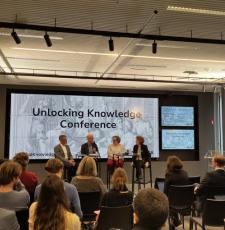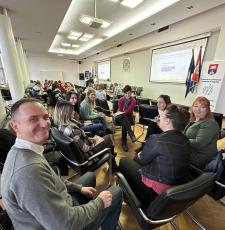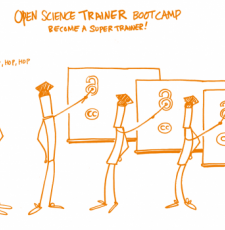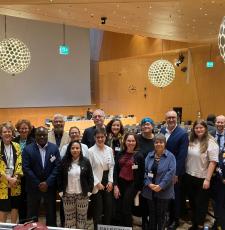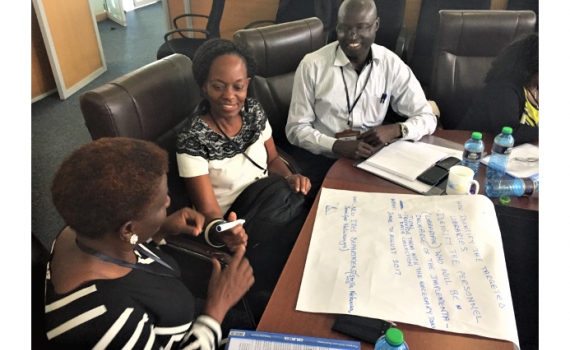
EIFL has been working with public libraries in Africa since 2010, supporting introduction of new services that use computers and the internet. In the course of our work, we observed that public librarians were struggling to collect statistics about their new services. Statistics gathering was limited to basic library operations, like lending books and library membership numbers.
For public libraries to show their value, and to convince governments to improve and increase infrastructure and facilities, they need accurate and credible statistics about the new kinds of services that they are offering - like events, computer-based information and education services, training and outreach.
To improve data collection processes and practices in the countries where EIFL has long-term commitments (Ethiopia, Ghana, Kenya, Namibia, Uganda and Zambia), we organized a workshop in Nairobi in 2017. We invited people from national public library networks and authorities who were directly responsible for library statistics. During the workshop, guided by EIFL and international library evaluation experts, participants reviewed and improved their service evaluation and data collection plans and processes. We also developed and shared templates of forms for collecting statistics and other data.
‘Statistics will speak for us’
When they got back home, participants from the National Library of Uganda (NLU) created a new form for public libraries to provide NLU with statistics about the use of library computers and the internet in services and training.
The NLU has used the statistics in conversations with the Uganda Communications Commission (UCC). The UCC has agreed to donate computers to Pallisa Public Library in Eastern Uganda, Hoima Public Library in Western Uganda and Nakaseke Community Library from Central Uganda, says Jennifer Nalwanga, who attended the EIFL-PLIP workshop on behalf of the NLU. Before the workshop they did not have any statistics to show UCC about use of library technology, and this had been a great obstacle in their conversations with the UCC.
Another questionnaire was made available for people who come to the library to use computers to describe how access to the computers has helped improve their lives (for example, to find jobs or improve their academic results).
“Statistics will speak for us. Collection of the right data in the right ways means we can tell our story, demonstrate accountability to decision- makers and make wise programme decisions for current and future efforts.” - Sharon Munshya-Liato, Principal Librarian at Zambia Library Service, Ministry of General Education.
Zambia Library Service (ZLS) has also adapted a form to capture data about use of computers and the internet in their libraries. In addition, they have developed a survey to gather information about the services provided by librarians, such as events, outreach programmes, training and services for people living with disability. The survey was disseminated to six of their provincial libraries in January 2018, to capture baseline information. It will be administered again in a year’s time, to measure changes.
The Namibian participants created an animated PowerPoint presentation which they have use to train staff in regional public libraries to collect data. Namutenya Hamwaalwa from the Namibia Library and Archives Services (NLAS) says that now librarians are compiling more accurate monthly statistics.
“The data and stories collected are being used to demonstrate to decision/policy makers the effectiveness and contribution of libraries to the country’s National Development Goals,” said Namutenya.
Applying improved data collection methods
During the workshop, participants from Kenya National Library Service (KNLS) expressed a wish to create a single system for collecting statistics, to replace a system which used different forms for different projects. Forms were being sent to different departments at KNLS headquarters, and statistics were not being shared between departments.
After the workshop, KNLS introduced an online questionnaire which they have shared with all 61 libraries in the KNLS network. Librarians collect information about how many people are using computers, and what they are using them for. The information is sent to KNLS headquarters every three months. KNLS uses the information in reports compiled for the Kenya Communications Commission, which equipped all 61 libraries in the KNLS with computers and the internet in 2016.
The numbers have started to come in and are surprising librarians who for the first time are seeing the real extent of computer use. For example, Laikipia-KNLS Library measured use of the library’s 10 computers over a three-month period and found that people used the computers in more than 800 sessions to access e-government services (like submitting tax returns and registering for exams); in more than 300 sessions to access online learning opportunities, and in 4,500 sessions for online searches and social media communications.
In July this year (2018) KNLS will start to measure and analyze the impact of outreach services in which they take digital technology (e-readers, tablet computers) preloaded with educational content to schools, to patients in hospitals and to youth in prisons. The survey will generate information about the benefits of the outreach service, especially in relation to improvements in reading skills and confidence using technology.
“There is a great need for data on impact of libraries on users and communities. Assessing impact will help in planning for more effective services and will also be useful to national policy-makers and other development partners.” - Richard Atuti, Director of KNLS.
SHARE / PRINT






